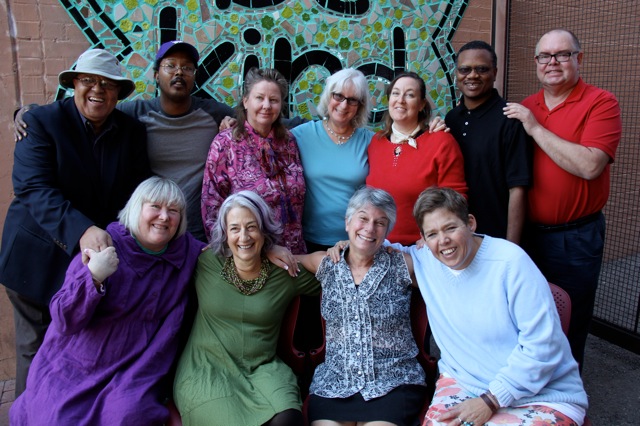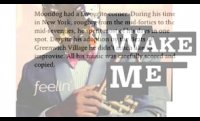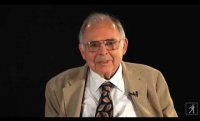Genre: Creative Nonfiction
Kingston University
Ripple, Kingston University Press
Bath Spa University
Shining a Light on Mental Illness: Sheila Wilensky's Thursday Writing Group
In 2012 and 2013, educator Sheila Wilensky led a series of P&W supported workshops at Our Place Clubhouse, a psych-social rehabilitation center in Tucson, Arizona, for adults recovering from serious mental illness. A high school social studies teacher for fifteen years in Vermont and Maine, Wilensky also taught children's literature at College of the Atlantic. From 1982 to 1997, she owned the Oz Children’s Bookstore in Southwest Harbor, Maine. In 2002, she got tired of the ice and snow, drove cross country, and has been living in Tucson ever since. She is currently associate editor of the Arizona Jewish Post. Wilensky blogs about her experience teaching the workshops and produced a chapbook of essays from participants titled, A Certain Slant of Light, which was released earlier this year.

I’ve lived through the civil rights, feminist, and LGBT movements for equality. Now it’s time to reduce the stigma of mental illness in our society. Our Place Clubhouse is a recovery community that encourages self-esteem, and offers job training programs and a safe haven for individuals living with serious mental illness. Around five years ago, I began editing the prolific writing of Rachel and Ira, both of whom struggled with schizophrenia. A week after the January 8, 2011 shooting in Tucson, which killed six people and wounded thirteen, including former U.S. Representative Gabby Giffords, I was meeting with Rachel.
“Why do people think that if you have a mental illness, you may pull out a gun and start shooting at any time?” asked Rachel, throwing her hands up in frustration.
A year later, I had this epiphany: We must change this damaging misconception. Studies indicate that individuals with severe mental illness are more likely to be the victims of violence than the perpetrators.
The Our Place Clubhouse Thursday Writing Group started on September 17, 2012. We sat around a seminar table in the clubhouse boardroom. We talked about our lives. I knew it was important to establish trust.
“We’re going to create a chapbook to help educate the community about living with mental illness,” I told my fourteen prospective coauthors. I’m not sure they believed me.
Writing prompts emerged from our conversations. The first was “any morning:” how to explain to others what a normal day was like for “crazy” people or that group members started their days like anyone else. They fed their pets, brushed their teeth, and some went to work—as pharmacist, baker, artist, peer counselor.
Every week we read our writing aloud with no feedback, judgment, or criticism—listening to individual voices striving for recovery, applauding after each person read. At the end of each session, Doreen, a former middle school language arts teacher, collected the pieces and put them in a folder for me to take home. Our process developed organically, as did my hugging each writer at the conclusion of a session.
I wanted everyone to feel ownership along the road to publication. We brainstormed titles. We peer edited our writing. The section, “What This Chapbook Means to Me,” is a record of the project’s success:
“Participating in this project has been a source of joy and freedom; the freedom to self-express the many faces of mental illness.” —Lani
“Writing this book is an exploration for me. Hearing others’ stories and writing about my own mental illness is invigorating.” —Doreen
“Any one of us can have behavioral disturbances or diseases of the brain. We stigmatize what we don’t understand. Life can be traumatic. I hope that this chapbook has given the reader pause. Let’s stop being afraid of ourselves.” —Pam
“This chapbook is a conversation which expresses our perspectives on lives affected by mental illness.... Most people who live with mental illness and brain disorders are productive in society and contribute a lot to the advancement of the American dream." —Tyrone
Our book launch took place in January 2014. More than two hundred people attended, including the mayor of Tucson.
Thank you to Poets & Writers for giving this project the legitimacy and support my coauthors deserve.
Photo: Sheila Wilensky (wearing green) and Our Place Clubhouse Thursday Writing Group members and staff; credit: Erica von Koerber.
Support for Readings & Workshops events in Tucson is provided by an endowment established with generous contributions from the Poets & Writers Board of Directors and others. Additional support comes from the Friends of Poets & Writers.
Photographs
Friends and family members often aren’t photographers. This sometimes results in great memories captured on film in a not-so-picturesque way. This week, think of a photograph depicting a fond memory that, in your opinion, doesn’t cast you or your loved ones in the most visually pleasing light. Do you still display or look at the picture often? Or do you keep it hidden in the shoebox under the bed? Write about the story surrounding the photograph, and how it makes you feel when you look at it.
PEN Announces Literary Award Winners
The New York City–based PEN American Center has announced the winners of the 2014 PEN Literary Awards. The annual awards honor emerging and established writers in a range of genres, including poetry, fiction, biography, children’s literature, sports writing, science writing, translation, and drama. This year PEN will award nearly $150,000 in prize money.
“Celebrating the written word is an essential part of defending it,” said PEN President Peter Goodwin, “and it is through PEN’s literary awards that we continue to honor some of the most exceptional books and bodies of work that free expression makes possible.” PEN has awarded its literary awards for over 50 years.
James Wolcott won the $10,000 PEN/Diamonstein-Spielvogel Award for the Art of the Essay for his essay collection Critical Mass (Doubleday). Geoff Dyer, Stanley Fish, Ariel Levy, and Cheryl Strayed judged. The annual award is given for an essay collection published in the previous year that exemplifies the dignity and esteem the essay form imparts to literature.
Dr. Carl Hart won the $10,000 PEN/E. O. Wilson Literary Science Writing Award for High Price (Harper). Akiko Busch, Rivka Galchen, and Eileen Pollack judged. The annual award is given for a book of literary nonfiction published in the previous year on the subject of the physical or biological sciences.
Ruth Ellen Kocher and Nina McConigley both won the $5,000 PEN Open Book Award, given for an exceptional book published in the previous year and written by an author of color. Kocher won for her poetry collection domina Un/blued (Tupelo Press); McConigley won for her short story collection Cowboys and East Indians (FiveChapters Books). Catherine Chung, Randa Jarrar, and Monica Youn judged.
Frank Bidart won the $5,000 PEN/Voelcker Award for Poetry, which is given biennially to a poet whose distinguished and growing body of work to date represents a notable and accomplished presence in American literature. Peg Boyers, Toi Derricotte, and Rowan Ricardo Phillips judged.
Karen Emmerich and Edmund Keeley won the $3,000 PEN Award for Poetry in Translation for Diaries of Exile (Archipelago Books), a poetry collection by the Greek poet, Yannis Ritsos. Kimiko Hahn judged. The annual award is given for a book-length translation of poetry into English published in the previous year.
Joanne Turnbull and Nikolai Formozov won the $3,000 PEN Translation Prize for their translation from the Russian of Sigizmund Krzhizhanovsky’s short story collection Autobiography of a Corpse (New York Review of Books). Ann Goldstein, Becka McKay, and Katherine Silver judged. The annual award is given for a book-length translation of prose into English published in the previous year.
The winners will be honored at PEN’s annual literary awards ceremony, held this year on September 29 at the New School in New York City. At the ceremony, PEN will announce the winners of the $25,000 PEN/Robert W. Bingham Prize for Debut Fiction and the $25,000 PEN/Saul Bellow Award for Achievement in American Fiction. Ron Childress, who won the $25,000 PEN/Bellwether Prize for Socially Engaged Fiction for his unpublished novel And West is West, will also be honored at the ceremony.
The shortlist and the longlist, issued for the first time this year, for each prize can be found on PEN’s website.
Confidence
Deep within us, we have desires or goals we might be nervous about bringing out into the open for whatever reason. Maybe we feel embarrassed or that we can't compete with those who have already mastered the skill we seek to learn. You might have felt this way when showing your writing to someone for the first time—or maybe you still haven't shown your writing to anyone yet. This week, think about whether there are any factors that make it difficult for you to share your work. If you've taken the leap and put yourself out there, write about what that felt like. If you have yet to do so, write about what's holding you back.
Twice Upon a Time
Hari Kunzru's digital memoir, Twice Upon a Time: Listening to New York (Atavist Books, 2014), incorporates music, recordings, movable text, and photographs for an interactive experience. Read more about Atavist Books in the July/August issue of Poets & Writers Magazine.
Ernest Hemingway's Manuscripts
Patrick and Sean Hemingway, the son and grandson of Ernest Hemingway, describe how the original manuscripts of A Moveable Feast provided insight on the man and his true intentions for the book. A Moveable Feast: The Restored Edition was released by Scribner in 2010.
Hitchhiking
Hitchhiking can seem scary to those who have never done it before. But, as Jack Kerouac famously portrayed in On the Road, it is also a cheap and interesting way to get from one place to another if you don’t have a car. Have you ever hitched a ride, or do you know someone who has? Write about the experience. If you have never hitchhiked, write about your feelings on the subject—whether you’d ever try it, or why you’ve decided it’s something you would never do.






